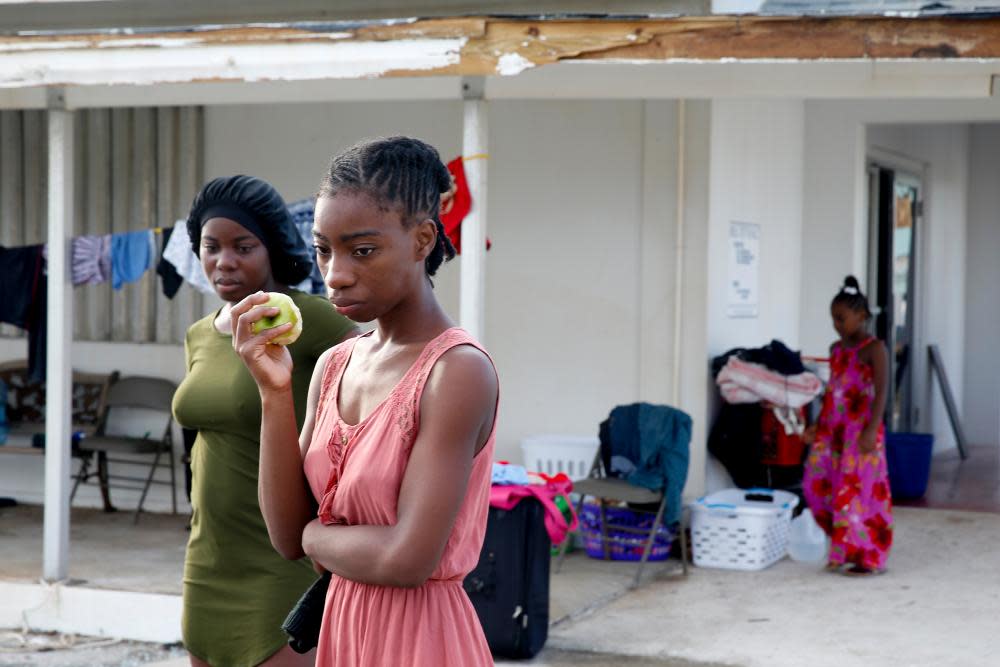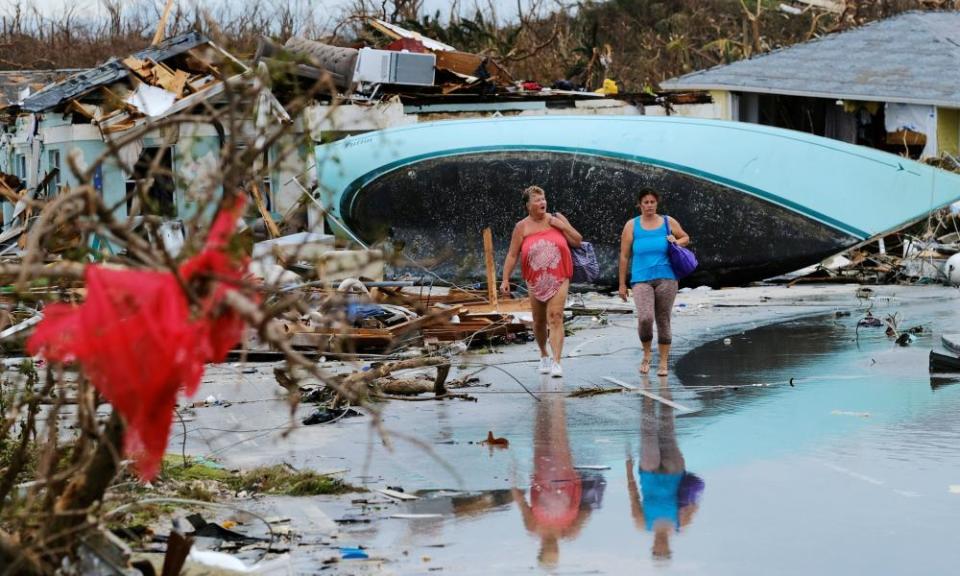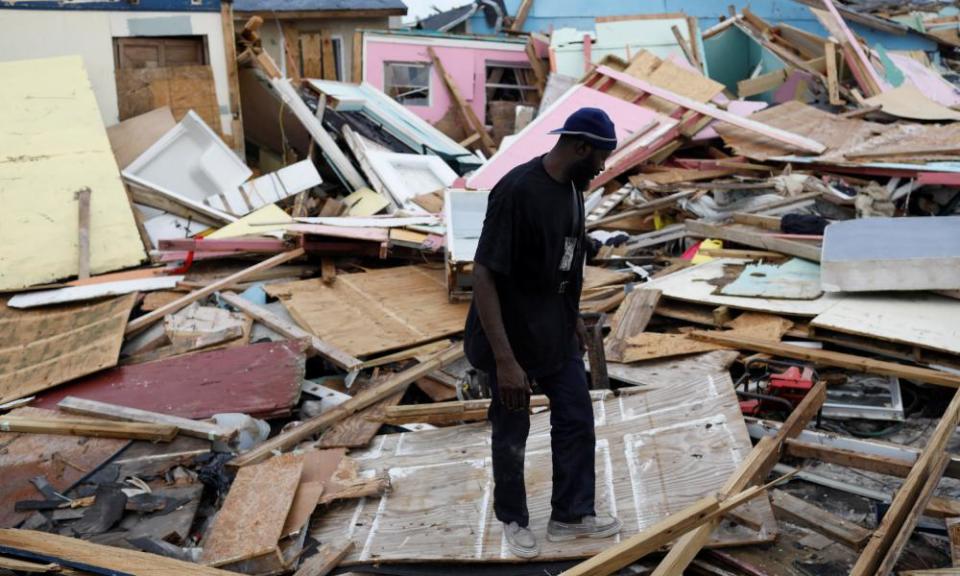'It's all gone': shattered Bahamas counts the cost of Hurricane Dorian's destruction

As Erica Roberts clung to a tall mango tree, the winds and sea water churned up by Hurricane Dorian pounding her face, a single thought ran through her head: “I will not die like this.”
Related: 'I thought no one was coming to rescue us': Abaco Islanders flee Dorian's destruction
Her home, in the small town of High Rock on the eastern side of Grand Bahama, had been swept away. Her 24-year-old daughter Natori survived too, clinging to branches beside her.
Roberts’ face and arms still bore dry, bloody cuts. The pair eventually lost their grip, she said, but they were swept close to a home that still stood. They got inside.
“By the grace of God, we made it,” she said. “We are survivors.”
The 41-year-old had not heard from seven close family members: two sons, a sister, two nephews, cousins, uncles. All were still missing. In a community of about 600, two were confirmed dead. At least 20 had not been heard from since Dorian spent two days destroying almost every building in sight.
“We need aid,” Roberts said. “We have nothing. Everyone is doing this self-sufficiently.”
The hurricane’s devastating 185mph winds brought destruction to Grand Bahama and the Abaco Islands and left at least 30 people dead – a toll that is sure to rise as emergency crews search for survivors.
Parts of the road in had been stripped of tarmac, leaving rubble, exposed pipework and pools of bronzed water where trapped fish still swam. Broken pylons dangled in the street. Palms were bent at 45 degrees, leaves shaved off by the wind.

The storm surge here, about half a mile from the sea, rose to around 20ft. Wind gusts were recorded at 220mph. Many who have lived here for generations said the brutality of the storm was something they had never seen or even heard of before.
For Roberts, who works at a nearby casino – also obliterated – the unprecedented intensity of Dorian, the way it strengthened so quickly to category 5 and stood over the island for more than 24 hours, had a simple explanation.
“I think the climate is playing a big role in all of this,” she said, starring at the muddy tiled floor of a partially destroyed home in which she had taken shelter. “The severity of this … it’s global warming.
“I’ve recycled all my life. I use less plastic. And think about less emissions. I’ve always been committed. But the world is not.”
As residents of High Rock began to assess the damage, the global climate crisis was on the minds of many.
Euridice Kemp, a 40-year-old resident of Freeport, had returned to help salvage what she could from her grandparents’ home. All that was left of the building were the concrete foundations. Belongings – crockery, family photos, clothes, wooden furniture – were strewn on the muddy grass. She pointed to the horizon where six coconut trees once stood, where she played as a child.
“It’s all gone. What we’re doing to Mother Earth and the way this turns around on areas like here … I just can’t. Never … never in my life. My heart is broken. I’m in shock.”
Did she consider herself a victim of the climate crisis?
“We are the biggest victims of climate change. But how can we fight for ourselves against bigger, global countries? How do we move forward?”
At the shoreline, the sea still churned. A lighthouse was partially destroyed, its light blown away, leaving only a red-and-white striped tower.
Pastor Joey Saunders, 61, was counting his blessings. The storm surge crept up to the roof of his house. He spent two days clinging to the branches of a tree, waiting for the water to recede, terrified that sharks might lurk below. The wind lashed him so hard, he began to feel numb.

“I couldn’t feel anything any more,” he said. “I was just so afraid.”
Aid had just begun to reach remote parts of the island. Bahamian officials warned of delays because of flooding.
At the port on Grand Abaco, the Royal Bahamas Defense Force (RBDF) helped people board a ferry that had come to pick up employees and had room for an additional 160. The crowd waited calmly as marines separated women and children to board first.
A British navy ship was sending in aid on a landing craft, including blankets and 500 boxes of ration packs to feed families of four. Senior Lt William Sturrup of the RBDF said the ship would return, and a 210ft landing craft from his force would come with supplies and trucks. Two yachts had brought in aid, including pallets of water bottles.
The UN announced the purchase of eight tons of ready-to-eat meals and said it would provide satellite communications and airlift storage units, generators and prefab offices. The UN humanitarian chief, Mark Lowcock, said about 70,000 people were “in immediate need of life-saving assistance”.
On Grand Bahama, a Royal Caribbean cruise ship dropped off 10,000 meals, 10,000 bottles of water and more than 180 generators, as well as diapers and flashlights. American Airlines said it flew a Boeing 737 to Nassau with 14,000lb of supplies. The Netherlands said it would send ships from the territory of Sint Maarten.
The Associated Press contributed to this report

